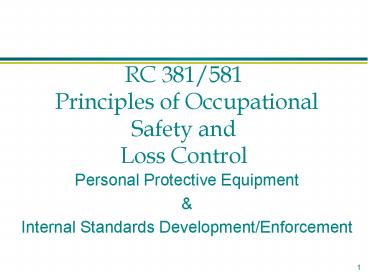RC 381581 Principles of Occupational Safety and Loss Control - PowerPoint PPT Presentation
1 / 11
Title:
RC 381581 Principles of Occupational Safety and Loss Control
Description:
Verify the assessment has been performed through written certification. 5 ... Training. Enforcement. Personal issues may require consideration. Physical limitations ... – PowerPoint PPT presentation
Number of Views:36
Avg rating:3.0/5.0
Title: RC 381581 Principles of Occupational Safety and Loss Control
1
RC 381/581 Principles of Occupational Safety
andLoss Control
- Personal Protective Equipment
- Internal Standards Development/Enforcement
2
Personal Protective Equipment (PPE)
- Apparel used to protect from hazards that can do
bodily harm through absorption, inhalation,
injection, and/or physical contact - Should only be used when hazards cannot be
controlled through engineering means - PPE design/materials must be specific to the
hazard encountered - Should never be modified by employee
3
Categories ofPersonal Protective Equipment
- Face/eye
- Head
- Foot
- Respiratory
- Fall
- Hearing
- Protective clothing
- Back/joint mobility support and/or control
Must meet rigid ANSI requirements
4
OSHA PPE Standard
- Basic Requirements
- Perform a formal job assessment to
- Identify existing/potential hazards
- Identify the specific form of PPE to address
existing/potential hazards - Develop internal standards outlining use
- Verify the assessment has been performed through
written certification
5
Negative Issues Regarding Use of PPE
- Difficult to continuously administer
- Purchasing
- Maintenance
- Storage
- Training
- Enforcement
- Personal issues may require consideration
- Physical limitations
- Allergic reactions/skin conditions
- Religious convictions
6
Negative Issues Regarding Use of PPE (cont.)
- May place greater stress on employee
- Restricted range of motion
- Physiological stress (heart, lungs, muscles,
heat) - May hamper employee production rate/quota
- Changes in production practices may require major
change in PPE used - In long run, will probably cost more than
development of engineering controls
7
Factors Positively Influencing PPE Programs
- Advance promotion of need
- Provide a reasonable selection
- Allow employees to test equipment
- Ensure proper personal fitting
- Be sensitive to individual needs
8
Factors Positively Influencing PPE Programs
(cont.)
- Allow for a period of adjustment
- Continuously promote use
- Provide behavior reinforcement
- Follow through to ensure use
- Ensure supervisors set the example
9
Developing Internal Standards
- Give reasons why standard(s) are needed
- Let employees participate in development
- Keep the number of standards to a minimum
- Keep standards practical(no pie-in-the-sky)
- Gain employee commitment to finalized standards
10
Presenting Internal Standards
- Review agreed-upon standards
- Use visuals with examples
- Test knowledge to ensure employees are thoroughly
conversant with standards
11
Enforcing Internal Standards
- Maintain standard enforcement records
- Initial presentation/training
- Refresher training
- Compliance/commendation
- Violations and follow-up action(s)
- Ensure unconditional enforcement of established
standards
12
Loss Tab Analysis
- The purpose of loss tab analysis
- Provide a map type of losses and where they
occur - Provide insight into losses - The frequency and
severity of loss problems - Provide a rough assessment of supervisory
personnel - Provide a basis for long range planning in loss
control management
13
Maintaining a Safe Healthful Workplace,
- Identify workplace hazards which currently exist
or could develop - Install procedures to control these hazards and
take actions to eliminate them if possible.































